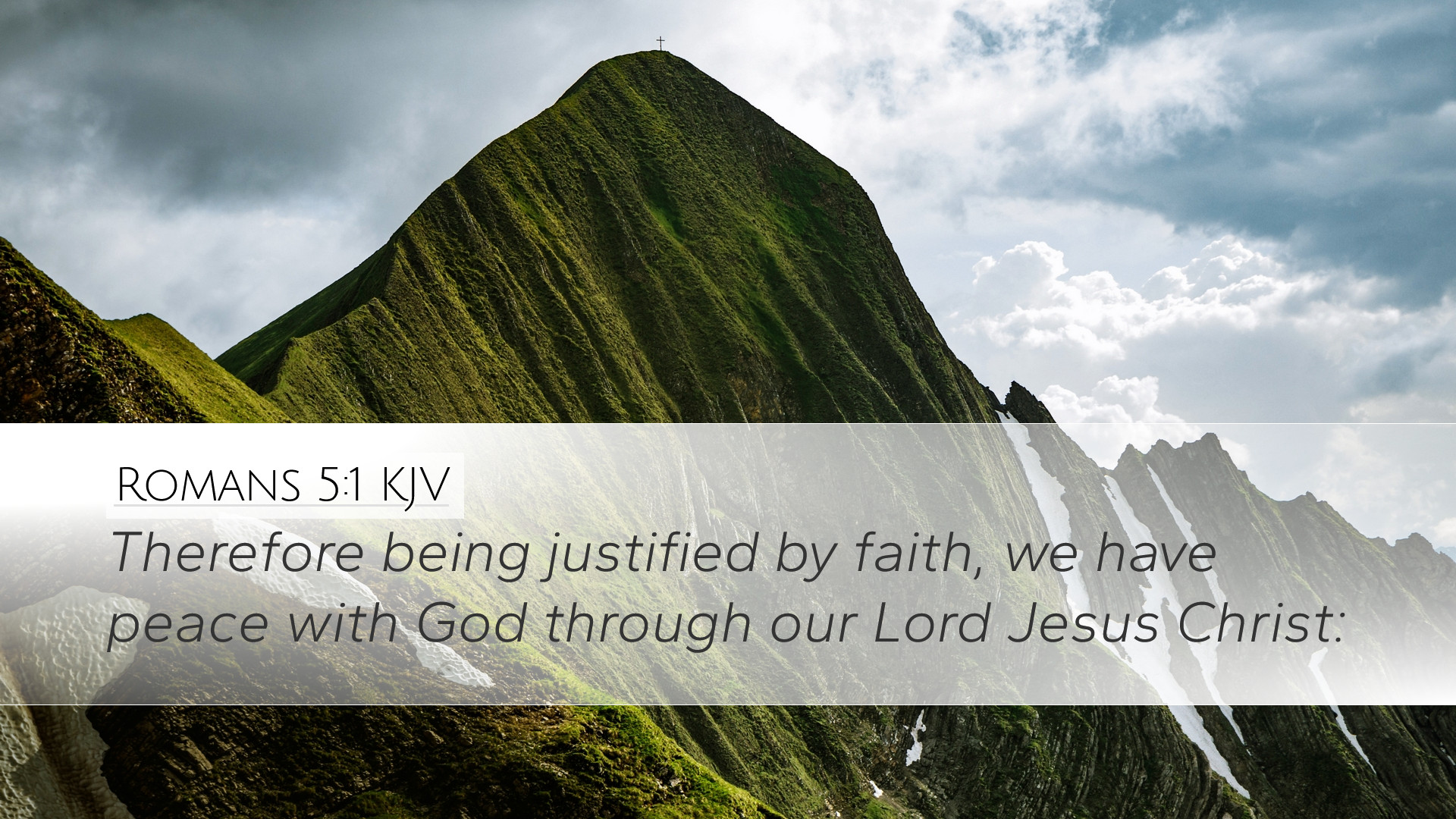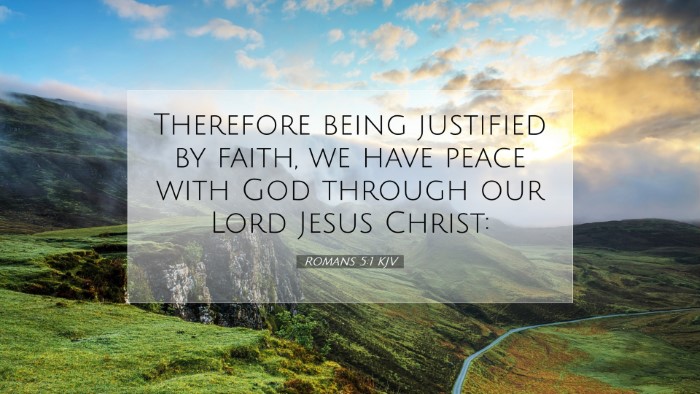Old Testament
Genesis Exodus Leviticus Numbers Deuteronomy Joshua Judges Ruth 1 Samuel 2 Samuel 1 Kings 2 Kings 1 Chronicles 2 Chronicles Ezra Nehemiah Esther Job Psalms Proverbs Ecclesiastes Song of Solomon Isaiah Jeremiah Lamentations Ezekiel Daniel Hosea Joel Amos Obadiah Jonah Micah Nahum Habakkuk Zephaniah Haggai Zechariah MalachiRomans 5:1
Romans 5:1 KJV
Therefore being justified by faith, we have peace with God through our Lord Jesus Christ:
Romans 5:1 Bible Commentary
Bible Commentary on Romans 5:1
Verse Reference: Romans 5:1 - "Therefore being justified by faith, we have peace with God through our Lord Jesus Christ."
Introduction
The Apostle Paul, in his epistle to the Romans, presents a profound theological statement in Romans 5:1, which encapsulates the essence of Christian doctrine concerning justification and reconciliation with God. This verse serves as a pivotal point in understanding the implications of faith, grace, and the resultant peace that believers enjoy.
Justification by Faith
Matthew Henry emphasizes that the phrase "being justified by faith" signifies the believer’s standing before God. Justification is not based on human effort or righteousness, but is entirely through faith in Jesus Christ. It is God’s act of declaring a sinner righteous on the basis of faith alone.
Albert Barnes adds that this justification "by faith" underscores a fundamental shift from the performance-based righteousness of the law to a relationship founded on trust in Christ’s redemptive work. This transition is crucial for understanding the freedom and assurance that come with salvation.
Adam Clarke elaborates that faith here is not merely intellectual assent; it is a deep-seated trust and reliance upon Christ’s sacrificial work on the cross, encompassing all aspects of salvation.
The Nature of Peace
Building upon justification, Paul declares that believers "have peace with God." This peace is multifaceted, representing both the cessation of hostility and the establishment of a harmonized relationship with the Creator.
Matthew Henry explains that this peace is a relational peace, one in which the enmity caused by sin is removed through justification. It conveys a sense of security and well-being in the believer's relationship with God.
Albert Barnes comments that this peace is not merely a subjective feeling, but an objective reality initiated by God. It transcends human understanding and is grounded in the assurance of salvation through the Messiah.
Adam Clarke points out that this peace involves both relational peace with God and the inward peace that the believer experiences, resulting from the confidence of being justified.
The Role of Jesus Christ
Paul attributes the believers' state of peace directly to "our Lord Jesus Christ." This indicates that reconciliation with God is solely through Christ, underscoring His unique and essential role in salvation.
Matthew Henry asserts that recognizing Christ as the mediator is vital. It is through His blood that believers gain not just peace, but also access to the grace in which they stand.
Albert Barnes reinforces this by stating that Christ’s work on the cross not only secures peace but also affirms His ongoing intercessory role before the Father.
Adam Clarke notes that the acknowledgment of Christ signifies the end of striving through works to attain peace; it illustrates the complete reliance on His redemptive work.
Theological Implications
This verse presents several theological implications that are significant for both personal faith and ecclesiastical teaching.
- Faith as the Means of Justification: The central idea that faith alone justifies highlights the core of Protestant theology and challenges any notion of legalism.
- Peace as Assurance: The peace with God provides believers with assurance in their faith walk, emphasizing that intimacy with God is restored.
- Christ as the Mediator: Understanding Christ’s role as the only mediator encourages a Christ-centered theology that guides worship and practice.
Practical Applications
The truths found in Romans 5:1 offer practical applications for believers seeking to embody their faith in daily life:
- Embrace Justification: Believers should rest in the assurance that their justification is secure through faith in Christ, freeing them from guilt and striving.
- Pursue Peace: Cultivating a sense of peace in their hearts and sharing it with others, especially within the context of community and church life.
- Proclaim the Gospel: Understanding the role of Christ should inspire an evangelistic zeal to share the message of peace and reconciliation with those still in enmity with God.
Conclusion
In summation, Romans 5:1 encapsulates the crux of Christian faith: justification by faith leading to peace with God through Jesus Christ. This profound truth has far-reaching effects, shaping not only personal belief but also the collective understanding of salvation within the Church. As Matthew Henry, Albert Barnes, and Adam Clarke elucidate, it is imperative for believers to grasp the beauty of this peace and the transformative power of faith as they navigate their spiritual journeys.


